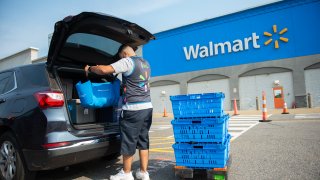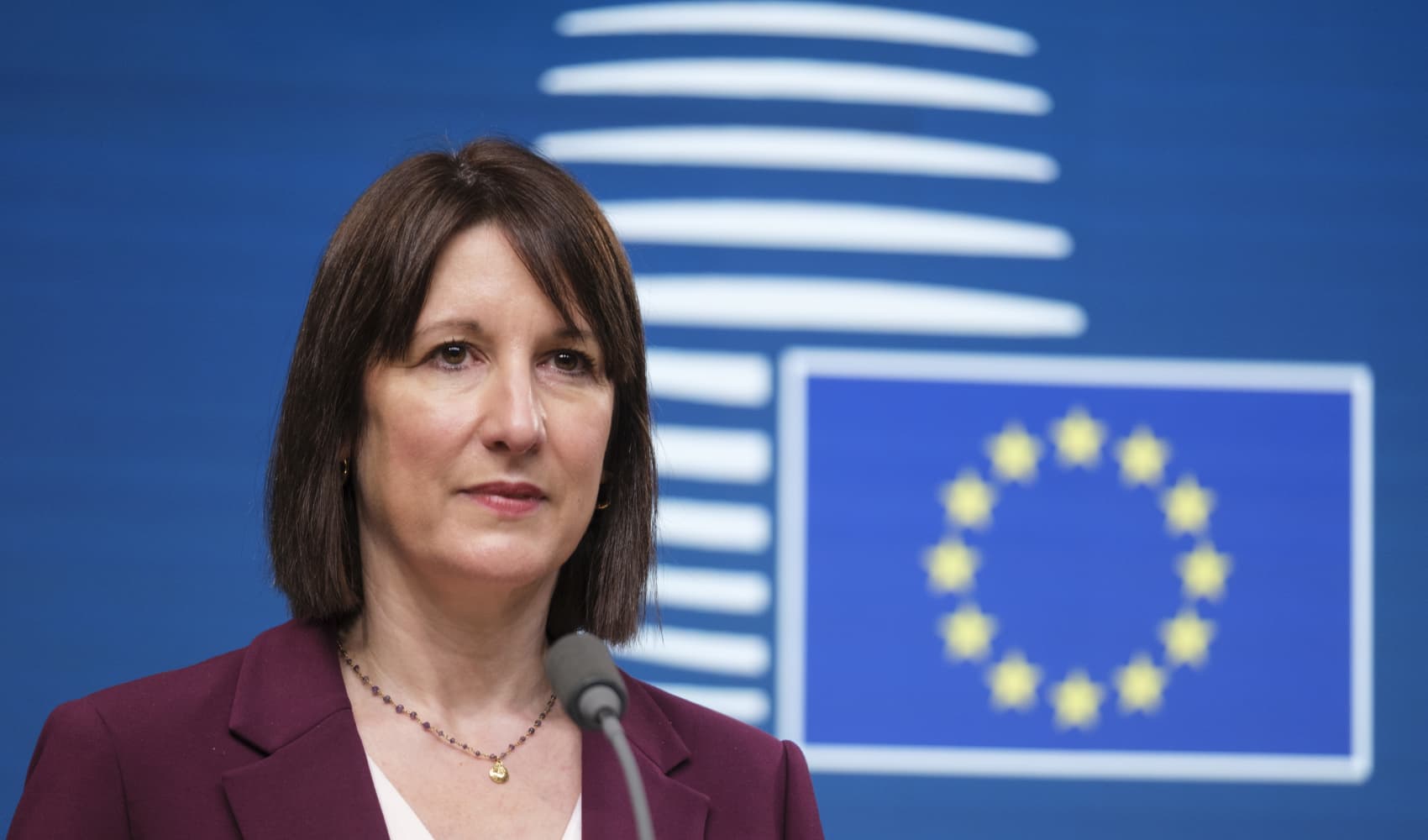
- Walmart is testing reusable tote bags as part of its direct-to-fridge delivery service, InHome, which is expanding across the country.
- The pilot project is part of a broader effort by the retail giant to deliver on a pledge to move toward reusable, recyclable or industrially compostable packaging and reach zero waste in its own operations in the U.S. and Canada by 2025.
- Other companies, including Estee Lauder, New Balance and Rent the Runway, are also looking for ways to move to a circular system of reusable packaging.
When Walmart rolled out a new grocery delivery service, it tested a bold premise: Customers letting a stranger walk into their homes to deliver milk, eggs and more directly into the fridge.
Now that expanding service, InHome, is testing whether the country's largest grocer and its shoppers can phase out reliance on single-use plastic bags and other kinds of disposable packaging that wind up in shoppers' homes — and ultimately, the landfill.
Walmart swapped out disposable bags for tote bags that it collected, washed and used again for the subscription service in the fall.
The pilot project, which was limited to a single store near the New York metro area, is part of Walmart's broader effort to deliver on a pledge to move toward reusable, recyclable or industrially compostable packaging for its private brands and reach zero waste in its own operations in the U.S. and Canada by 2025. In the first half of this year, Walmart plans to test alternatives to single-use plastic for curbside pickup and home delivery, said Jane Ewing, Walmart's senior vice president of sustainability. Those services are fast-growing parts of Walmart's grocery business, after shoppers got used to the convenience during the pandemic.
Wall Street, lawmakers and consumers have put pressure on publicly traded companies to set lofty sustainability goals. A growing number of states, major U.S. cities and countries are banning or charging fees for single-use plastics. Consumers, particularly millennials and Gen Z, are paying more attention to companies' environmental impact. And investors are considering environmental, social and governance policies as a factor when deciding when to buy or sell a company's stock.
Judith Enck, president of nonprofit Beyond Plastics, said companies are "reading the writing on the wall," much as they did when states and cities began passing laws that phased in higher minimum wages.
Money Report
Yet she said she has grown weary of seeing retailers and consumer packaged goods companies make promises that come with years-long timetables and incremental steps.
"Companies need to be bolder and they need to move faster," she said. "These shouldn't be pilots. They should be standard store policy."
Feeling out of the loop? We'll catch you up on the Chicago news you need to know. Sign up for the weekly> Chicago Catch-Up newsletter.
From cucumbers to clamshells
At Walmart, Ewing said her team scours store aisles and back rooms for ways to eliminate plastics from its supply chain, from films that wrap up pallets of merchandise to clamshells that hold leafy greens.
She said Walmart is especially focused on finding ways to keep fruits and vegetables fresh with less packaging. It worked with start-up Apeel to put an invisible, edible plant-based coating on a cucumber instead of shrink-wrapping it in plastic.
Yet even some of the retailer's progress reveals the heavy lift ahead: For example, Walmart recently removed a plastic window from a box that holds plastic cutlery sold by its private label, Ewing said. That small change will be multiplied across inventory throughout its more than 4,700 U.S. stores. Yet that doesn't solve the underlying problem: The plastic utensils themselves.
Private brands only drive a fraction of Walmart's total sales, too. That means it must ultimately coax suppliers to change packaging to shift the balance of single-use plastics at Walmart's stores. Eliminating or cutting back on packaging is one of the key parts of Project Gigaton, an effort that Walmart launched five years ago that aims to reduce 1 gigaton of greenhouse gas emissions from the company's supply chains by 2030.
Walmart is part of Beyond the Bag, an initiative by retailers including Target, CVS Health, Kroger and others to look for solutions to the single-use plastic bags.
As part of that, Walmart has tried out other options: Goatote and Chico Bags, two different kiosk systems that allow shoppers to borrow and return reusable bags; and Fill it Forward, an app-enabled tag that customers can add to their own bag, which tracks and incentivizes use by giving rewards.
"Most customers want to do the right thing: They want to lead a more sustainable life," Ewing said. "But as a retailer, we have to make it easy for them. If it's too complex, too hard, they're not going to do it. So we have to figure out how can we build this just into the flow of their regular shopping experience and take out the pain points for them."
By the end of this year, Walmart plans to expand the InHome delivery service's availability from 6 million to 30 million households. The subscription program costs $19.95 per month.
In the coming months, more of those customers will get their milk, pasta and other purchases delivered to the kitchen or garage with reusable tote bags, Ewing said. Employees unload and collect the totes or customers leave out totes for when an employee makes the next delivery.
Walmart has not yet decided which markets and how many customers will get the totes, but Ewing said it will expand the pilot in the Northeast. Ultimately, she said she would like to see the totes used by InHome across the country.
This would layer onto other efforts it is making. For example, Walmart has reserved 5,000 electric delivery vans from General Motors, which it will use for InHome deliveries.
A circular system
The tote bags for the InHome pilot are made by Returnity, a company that is trying to move retailers and consumer packaged goods brands away from disposable boxes and bags and toward a circular system of containers that can be used again and again. Returnity has developed packaging for Estee Lauder, New Balance and Rent the Runway.
Mike Newman, CEO of Returnity, said for the model to work, reusable packaging must make financial sense: It must be used frequently, designed with recycled plastics or other sustainable materials and achieve a return rate of more than 92%. With Walmart, he said, the return rate was nearly 100%.
Returnity counts James Reinhart, CEO and co-founder of online thrift store ThredUp, as one of its early investors.
Yet with ThredUp, reusable packaging flopped and became a telling lesson, Newman said. Too many customers tossed rather than used company-provided bags when cleaning out closets of clothing and accessories for secondhand sale, Newman said.
"You have to be cost competitive," he said. "It doesn't matter how green it is, if it can't be economically viable. It's never going anywhere."






